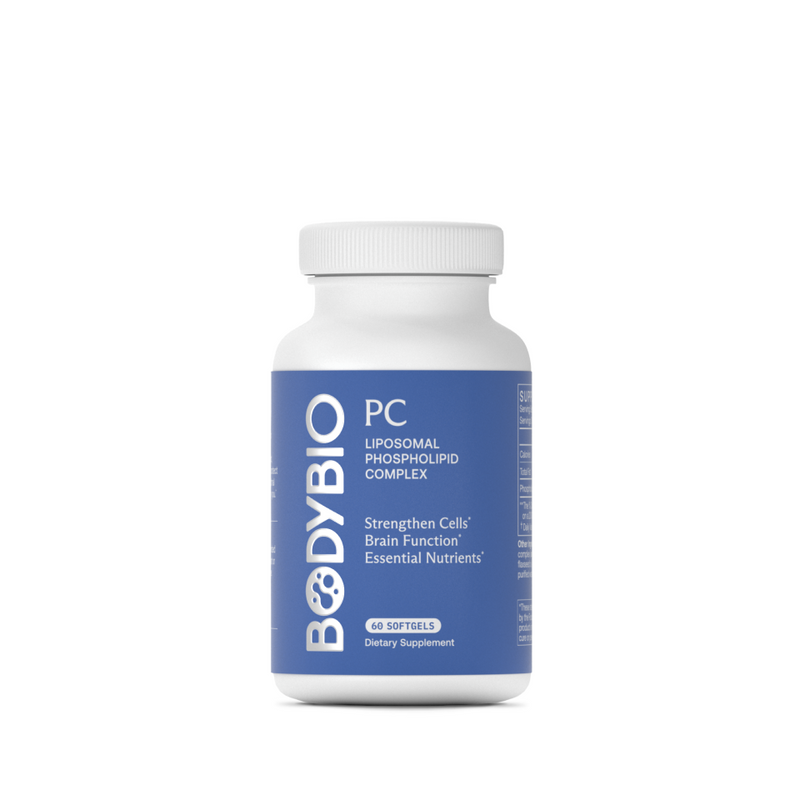Supplements for Detox: How to Eliminate Toxins Without Depleting Nutrients
Authors:

Dr. Thomas Wnorowski
PhD, CNCC Research Director, BodyBio & Biomedical Nutritionist
Key Takeaways:
- Detoxing should be one of your top concerns for optimal health. In a world full of pollutants and toxins, supporting the body’s natural detox pathways is more important than ever for overall wellness and cellular function.
- Supplements like binders (charcoal, bentonite clay, etc.) are commonly used to detox the body. However, many people don’t realize that binders also bind to minerals, fatty acids, cholesterol, and more essential nutrients. Using them long-term could pose a threat to your cellular health and leave you feeling tired and depleted.
- There are a number of supplements that may be used for detox that eliminate toxins while still nourishing the cells and the whole body. Some of them include glutathione (a powerful antioxidant), phospholipids, and TUDCA.
If you’ve spent time with any health-obsessed friends lately, you probably know a lot about detox. It’s a holistic health buzzword — and no, it’s not just a fad. As our world slowly becomes more toxic (allowing pollution into our water, air, food, and indoor living environments), understanding the body’s detoxification methods and how to care for them is vital.
One of the most common ways to support detox is through supplementation — particularly binders (like activated charcoal, bentonite clay, and a drug called cholestyramine) that bind to toxins and flush them out. These compounds can do a lot to remove toxins, but they may also remove vital nutrients in their wake.
At BodyBio, many are aware that we don't produce binders. Instead, our unique approach to detoxification dives deep into the cellular level, investigating the ways toxins influence our cells, breaking them down, and ultimately, flushing them from our system. Toxins have the potential to latch onto our DNA, which can modify gene expressions, leading to the creation of abnormal proteins and lipids. By targeting health at its very foundation—the cellular level—we can correct these genetic deviations. Using a combination of phospholipids, essential fatty acids, and chemical chaperones such as Butyrate and TUDCA, we’ve been able to help restore and normalize cellular function. This philosophy and commitment to cellular health is what sparked the inception of BodyBio over 30 years ago.
Table of Contents:
- Why We Need Supplements for Detox in the Modern World
- Symptoms of Blocked Drainage: What Happens When We Can’t Detox?
- The Best Supplements for Detox (That Aren’t Binders!)
- The Role of Detox in Cellular Health
- The Biggest Game Changer for Detox — Liposomal PC
Why We Need Supplements for Detox in the Modern World
The body is actually brilliant at detoxifying. When toxins enter your body, there are multiple ways they can be neutralized and escorted out of the body. Toxins may be subdued by the gut microbiome, flushed through the lymphatic system, and/or processed through the liver. The kidneys, skin, digestive tract, and even the brain are all involved in the process of detoxification, too.
So if the body is so good at detoxifying, why do we need supplements for detox?
The world is rapidly becoming more toxic around us. Our air, food, personal care products, and water supply are polluted by chemicals and microplastics that are getting into our digestive system and bloodstream. A steady dose of everyday chemicals, toxins, and prescription drugs can quickly overload (and clog up) our detox pathways.
The truth is, our bodies simply haven’t faced toxins on this scale before.
Supplements for detox (like phospholipids, TUDCA, butyrate, and glutathione) can help us unblock our detox pathways by providing nutrients and extra drainage support where our bodies need it most.
Symptoms of Blocked Drainage — What Happens When We Can’t Detox?
When our detox pathways are blocked, our bodies can’t properly get rid of toxins from our bloodstream. Most likely, they’ll recirculate through the bloodstream and lymph until they can find a way out — causing uncomfortable symptoms in the meantime.
Common symptoms of blocked drainage pathways may include:
- Brain fog
- Fatigue
- Gut dysbiosis and poor digestion
- Constipation
- Muscle aches
- Joint pain and stiffness
- Weight gain (toxins can be stored in fat tissue)
- Liver inflammation
- Kidney stones
- Recurring infections like UTIs or yeast
- Puffiness and swelling
- Headaches
- Insomnia/sleep issues
- Cellulite
- Skin conditions (i.e., acne, eczema)
- Difficulty sweating
The Best Supplements for Detox (That Aren’t Binders!)
There are a lot of holistic interventions you can use to get your drainage pathways moving again (read: exercise, lymphatic massage, dry brushing, sauna, lemon water, etc.) But high-quality supplements are still going to provide critical detox support for most people, especially if you have an existing health concern or are experiencing any of the poor detox symptoms listed above.
These supplement recommendations are meant to support your body’s natural detox pathways, moving toxins out of the body while preserving your nutrient status.
Phospholipids
Maybe you’re familiar with detox and binder drugs like cholestyramine, which work to bind toxins in the body and flush them out of the system. But did you know cholestyramine can also bind to vital nutrients, cholesterol, minerals, and dietary fats as well? If you’re taking this drug several times a day, as with intense mold detox protocols, you could be seriously depleting your nutrient intake no matter how healthy your diet is.
For a chronically ill person, this loss of nutrients could be detrimental to recovery, possibly even worse than the excess load of toxins. Instead of binders, we prefer a healthy blend of phospholipids, including phosphatidylcholine (PC), phosphatidylserine (PS), phosphatidylinositol (PI), and phosphatidylethanolamine (PE). Phospholipids assist with detox naturally without depleting the body of additional nutrients. As an added bonus, phospholipids also nourish the cell membranes and mitochondria, which is essential for a steady recovery.
TUDCA
Specifically targeting liver and gallbladder health, TUDCA (aka, tauroursodeoxycholic acid) is a bile salt used for eons in Chinese medicine that helps get bile moving in the liver and gallbladder. Most toxins are processed through the liver, so when the liver is overloaded, it may become sluggish and not work as well as it should. This also impacts gallbladder function and health.
The gallbladder is critical for storing bile, which naturally sequesters certain toxins that enter the body with our food and drink. Digesting fats may become more difficult and inflammation can skyrocket as toxins are reabsorbed into the body until they can be filtered out.
Humans only produce a small amount of TUDCA, so supplementation is often needed when toxin overload comes into play. Since TUDCA also helps with the digestion of fats, it can also help you properly absorb vitamins and minerals from those fats — more TUDCA could mean more nutrients for your cells.
BodyBio Tip: We typically recommend taking TUDCA with ox bile. This is because there are four essential bile acids in the body that need to maintain a careful balance. Ox bile ensures we get the other three bile acids alongside TUDCA and don’t throw off that balance with long-term use. If you are using TUDCA for short-term toxin exposure or cycling it on and off, you may choose to use it on its own.
Butyrate
A short-chain fatty acid, butyrate is naturally produced in the gut by your microbiome. Although, many of us aren’t creating enough of it due to heavily processed foods and low-fiber diets. Enter, butyrate supplements! Butyrate integrates naturally into the detox process by supporting our microbiome and gut lining.
One of the best ways to get rid of toxins is through the bowels — but if your digestive system isn’t properly metabolizing nutrients or working optimally, your detox process could be interrupted and significantly hinder your body’s ability to eliminate toxins.
If you experience regular constipation or diarrhea, butyrate can help to regulate your digestive tract and prepare your body to detox right.
Chemical Chaperones: Butyrate and TUDCA
Chemical chaperones are small molecules that assists in the folding, stability, and activity of proteins, especially under conditions where proteins are prone to misfolding. Misfolded proteins can lead to various diseases and cellular dysfunctions. Chemical chaperones can help prevent these unwanted conditions by ensuring that proteins attain their correct conformation or by stabilizing the correctly folded state. Both Butyrate and TUDCA are chemical chaperones.
-
Butyrate: Primarily known as a short-chain fatty acid, butyrate also influences gene expression and can have protective roles in the cell. It may help to break down toxins attached to our DNA.
-
TUDCA: Studied for its potential to act as a chemical chaperone, it can protect cells from stress, particularly stress that affects the endoplasmic reticulum, a cellular organelle involved in protein folding and processing.
Liposomal Glutathione
This powerful antioxidant is critical for detox throughout the entire body — starting with the cells. As an antioxidant, glutathione protects the cells from free radicals, moving nutrients in and waste out. This is why we recommend glutathione over other supplements for detox, like binders. Typically, you won’t see nutrient depletion when supplementing with liposomal glutathione — instead, you may notice more mental clarity, increased energy, and better overall wellness.
Liu, H., Wang, J., He, T., Becker, S., Zhang, G., Li, D., & Ma, X. (2018). Butyrate: A Double-Edged Sword for Health?. Advances in nutrition (Bethesda, Md.), 9(1), 21–29. https://doi.org/10.1093/advances/nmx009
Biruete, A., Hill Gallant, K. M., Lindemann, S. R., Wiese, G. N., Chen, N. X., & Moe, S. M. (2020). Phosphate Binders and Nonphosphate Effects in the Gastrointestinal Tract. Journal of renal nutrition : the official journal of the Council on Renal Nutrition of the National Kidney Foundation, 30(1), 4–10. https://doi.org/10.1053/j.jrn.2019.01.004
Shao, J. W., Ge, T. T., Chen, S. Z., Wang, G., Yang, Q., Huang, C. H., Xu, L. C., & Chen, Z. (2021). Role of bile acids in liver diseases mediated by the gut microbiome. World journal of gastroenterology, 27(22), 3010–3021. https://doi.org/10.3748/wjg.v27.i22.3010
Gundermann, K. J., Gundermann, S., Drozdzik, M., & Mohan Prasad, V. G. (2016). Essential phospholipids in fatty liver: a scientific update. Clinical and experimental gastroenterology, 9, 105–117. https://doi.org/10.2147/CEG.S96362
Jackson, E., Shoemaker, R., Larian, N., & Cassis, L. (2017). Adipose Tissue as a Site of Toxin Accumulation. Comprehensive Physiology, 7(4), 1085–1135. https://doi.org/10.1002/cphy.c160038
Pastore, A., Federici, G., Bertini, E., Piemonte, F. (2003). Analysis of glutathione: implication in redox and detoxification. Clin Chim Acta, 333(1), 19-39. https://doi.org/10.1016/s0009-8981(03)00200-6
Bodewes, F.A., Wouthuyzen-Bakker, M., Bijvelds, M.J., Havinga, R., de Jonge, H,R., et al. (2012). Ursodeoxycholate modulates bile flow and bile salt pool independently from the cystic fibrosis transmembrane regulator (Cftr) in mice. Am J Physiol Gastrointest Liver Physiol, 302(9), G1035-42. https://doi.org/10.1152/ajpgi.00258.2011



